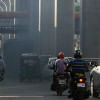Unfit buses rule city streets


More than one in five buses of private operators running in the capital have no valid fitness certificates.
According to the data from the Bangladesh Road Transport Authority, 3,974 buses of 75 companies have the required route permits for operating in Dhaka city, but 871 of the buses, 21.92 percent, do not have fitness clearances.
The Daily Star has obtained a document, containing the data, that was placed before a meeting at the headquarters of Bangladesh Road Transport Authority (BRTA) on May 5 where many bus owners were present.
In reality, over 120 operators run more than 5,000 buses in the capital. And many of the vehicles do not have route permits and they ply the city streets allegedly by bribing, say transport sector insiders.
On October 13 last year, Dhaka South City Corporation Mayor Sheikh Fazle Noor Taposh said over 1,600 unauthorised buses were operating in the city despite an ongoing drive against such buses.
The issue of unauthorised buses was discussed last month at the meeting of the coordination committee tasked with bus route rationalisation and operating buses under companies.
The government in 2019 formed a committee to rationalise bus routes and have a limited number of bus service providers. So far it has managed to launch the system in three of the 42 reshaped routes.
Member secretary of the committee, Shabiha Pervin, also executive director of Dhaka Transport Coordination Authority, said Hanif Paribahan, which was supposed to operate on route-23, expressed disinterest as many unauthorised buses were running there, meeting minutes show.
Route-23 starts from Ghatarchar and ends at Chattogram Road via Shyamoli, College Gate, Asad Gate, Kalabagan, Science Lab, Shahbagh, Jatiya Press Club, Gulistan, Dainik Bangla, Kamalapur, Dhalpur, Jatrabari, Shanir Akhra, Rayerbagh, Matuail, and Signboard.
Transport expert Prof Hadiuzzaman said unfit vehicles are risky for other fit vehicles too.
The former director of the Accident Research Institute at Buet said pedestrians in Dhaka are more vulnerable and such unfit vehicles increase their risk. The vehicles are causing serious environmental pollution, he told The Daily Star yesterday.
He said drivers of unauthorised vehicles know that they have a strong clout that allows them to run illegal vehicles and that is why they drive vehicles more recklessly.
Khondaker Enayet Ullah, general secretary of the Dhaka Road Transport Owners' Association, admitted that there were buses on the streets without fitness certificates.
"But how will the association know which buses have no fitness clearances? The BRTA has the data and it can take action against those," he told this newspaper.
He said owners of some 1,500 buses sought route permits a few years ago and the regional transport committee had even recommended the permits be issued.
But the coordination committee in 2019 decided not to issue route permits anymore, which made the 1,500 buses illegal, he said.
He refused to comment on the allegation that the illegal buses were running by paying bribes.
Most city buses operate on "trip system", in which the owners receive a certain amount of money for a set number of trips the drivers make. The drivers and their helpers get to keep all money earned from any trips beyond the set number. This system promotes racing on the streets, one bus cutting off another, buses blocking streets to prevent being overtaken by another bus, and picking up of passengers here and there, experts said.
This is why transport experts had recommended rationalisation of bus routes and bringing all public buses under a fixed number of companies for better regulation.
Late DNCC Mayor Annisul Huq had taken the initiative. Later, the government in September 2018 formed a committee, led by the DSCC mayor, to introduce the system and rationalise the routes.
The authorities preliminarily decided to have 22 companies running 42 routes.
On December 26, 2021, the new system was launched with Nagar Paribahan on one route. In October last year, Nagar Paribahan started operating on two more routes.
Asked about the slow implementation progress, Prof Hadiuzzaman said it would complicate the situation further. As the issuance of route permits to new buses has been suspended for a long time, the slow implementation will deteriorate the public transport crisis, he added.
Contacted, BRTA Chairman Nur Mohammad Mazumder said their mobile courts and police would take action against those buses running without fitness clearances.
Asked about the unauthorised buses, he told this correspondent yesterday that those will be impounded after drives.
DTCA's Shabiha Pervin is abroad and could not be reached for comments. However, a DTCA official said they were trying to introduce the system on five more routes this year.

 For all latest news, follow The Daily Star's Google News channel.
For all latest news, follow The Daily Star's Google News channel. 







Comments